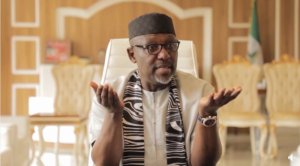
The ongoing financial corruption scandal surrounding the Federal Ministry of Humanitarian Affairs and Poverty Alleviation has taken a new turn with allegations that Minister Edu Betta approved the disbursement of ₦585,198,500.00 into a personal account. The funds, intended for vulnerable groups in Akwa Ibom, Cross River, Ogun, and Lagos states, were reportedly directed to Oniyelu Bridget, sparking concerns about financial transparency.
A document, signed by Minister Edu and addressed to the Office of the Accountant-General of the Federation, surfaced, indicating the specific instructions for the disbursement to Oniyelu Bridget’s account. The revelation has raised questions about the appropriateness of channeling substantial government funds into an individual’s private account.
In response to these allegations, Rasheed Zubair, the Special Assistant on Media and Publicity to Minister Betta Edu, asserted that the ₦585.198 million payment followed due process. Zubair clarified that the funds were allocated for vulnerable groups and justified the payment to Oniyelu Bridget by stating that she currently serves as the Project Accountant of Grants for Vulnerable Groups.
He explained that the payment of the N585.198 million grant was meant for vulnerable groups in Akwa Ibom, Cross River, Ogun and Lagos states.
“For the avoidance, the said N585m was approved, and it is meant to implement grants to vulnerable groups in Akwa Ibom, Cross River, Ogun, and Lagos states.
“We must note that GVG was first launched in Kogi State, where recipients testified. Akwa Ibom and Cross River were launched in December 2023. Kogi already happened in November, and others will be launched in the coming weeks.
“The general public is invited to note that the Renewed Hope Grant for Vulnerable Groups is one of the social intervention schemes of the Federal Government, which the Ministry of Humanitarian Affairs and Poverty Alleviation is implementing.
“Oniyelu Bridget is the Project Accountant for GVG from the Department of Finance, and it is legal in civil service for a staff, the project accountant, to be paid and use the same funds legally and retire the same with all receipts and evidence after the project or programme is completed”, he stated.
Meanwhile, the development caused a stir on social media as Nigerians wondered why a huge sum of the Federal Government’s money would be paid to an individual’s account.
Pmnews.ng gathered that public sector financial regulations of 2009 prohibit the payment of public funds to the account of a private individual.
Section 713 of the law states, “Personal money shall in no circumstances be paid into a government bank account, nor shall any public money be paid into a private bank account. An officer who pays public money into a private account is deemed to have done so with fraudulent intention.”
Recall that President Bola Ahmed Tinubu barely four days ago suspended the National Coordinator of the National Social Investment Programme Agency, Halima Shehu, an agency under Edu, over alleged financial misappropriation.
Consequently, Halima Shehu was detained and drilled by the Economic Financial Crimes Commission, EFCC, over an alleged N44 billion fraud.
Following an investigation, EFCC froze N30 billion moved from NSIPA’s accounts.
Similarly, a former Minister of the Ministry, Sadiya Umar-Farouq, was invited by the EFCC over a financial scandal allegedly carried out through one contractor, James Okwete.






Be First to Comment